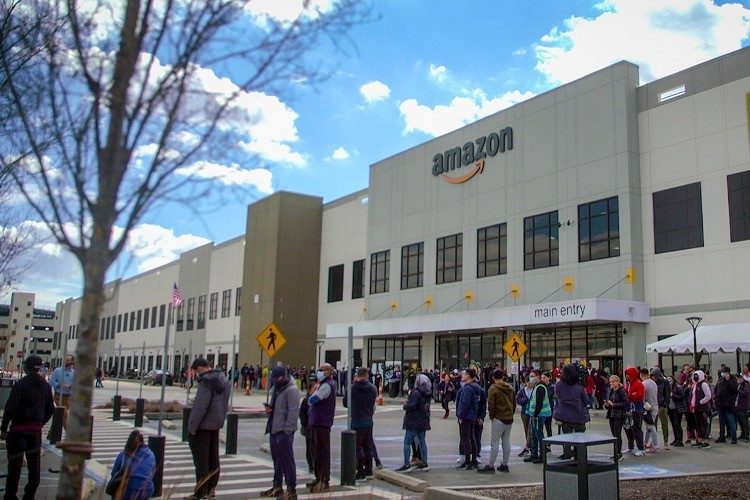
Amazon and the group responsible for organizing the online merchant platform’s first-ever union in the United States are headed for round two on Monday as a federal labor board counts votes by warehouse workers in another Staten Island election.
A second win by labor against Amazon could encourage workers at the company’s other facilities to begin unionization efforts of their own. Furthermore, it would firmly establish the power of the Amazon Labor Union (ALU), the collective of current and former employees behind last month’s victory.
Conversely, a loss by the union could give credence to arguments by critics that the former win was merely a fluke.
The National Labor Relations Board, which is overseeing the election, is expected to make the results public Monday evening. The agency must also decide whether to certify the first win, which Amazon disputes.
In contrast to last month’s election, there are far fewer workers eligible to vote in the current contest — about 1,500 compared with 8,300 at the neighboring Staten Island facility. There are also fewer organizers — approximately 10, compared to the previous 30.
“It’s a much more personal, aggressive fight over here,” said Connor Spence, an Amazon employee who works as the union’s vice president of membership.
According to Spence, there was greater support for the organizing efforts earlier in the year when the ALU filed for an election. The larger facility across the street, however, drew more attention and energy from organizers.
Amazon, meanwhile, repeatedly held mandatory meetings to persuade workers to reject the union effort, going so far as to post anti-unionization flyers and launching a website calling on workers to “vote NO.”
In a statement, Amazon spokeswoman Kelly Nantel said it is employees’ decision whether to join a union or not. But “as a company, we don’t think unions are the best answer for our employees,” Nantel said. “Our focus remains on working directly with our team to continue making Amazon a great place to work.”
While experts say the fledgling union is at a disadvantage due to its low number of organizers, it may be able to overcome this factor due to the legitimacy ALU gained with last month’s upset win. Additionally, ALU has the support of top union leaders and renowned progressive politicians. At a rally held outside the warehouse a day before voting began last week, U.S. Senator Bernie Sanders (I-Vt.) and Representative Alexandria Ocasio-Cortez (D-N.Y.) spoke in support of the unionization cause.
“This is certainly about ALU, but it’s also about the broader desire for organizing right now,” said Sara Nelson, president of the Association of Flight Attendants, who also attended the rally. “And we have to run as fast as we possibly can in this environment to organize millions of people if we’re going to change the power structure in this country and actually give working people a fair shot.”
AP notes:
After their first Staten Island win, ALU organizers reoriented their attention to the smaller warehouse and reiterated their vision to workers — longer breaks, better job protection and a higher hourly wage of $30, up from the minimum of just over $18 currently offered on Staten Island.
Spence said they also tailored their pitch to part-time workers, whom the facility depends on heavily and who have been waiting on their requests to transfer to full-time work at the company. By the time votes were cast, he believed the union had regained its momentum.
“We had to claw it back,” he said.
Despite one victory in its column, ALU has progressed slowly. Amazon last month filed objections over the union drive, making the case in a NLRB filing that the vote was tainted by organizers and by the board’s regional office in Brooklyn that oversaw the election. The company wants a new election, but pro-union experts believe it’s a bid to delay contract negotiations and take the steam out of the organizing momentum.
In spite of these setbacks, the ALU has made gains in other areas, placing public spotlight on Amazon’s anti-union tactics and raising concerns about the company’s workplace conditions. This has led others to take action.
Sanders on Tuesday urged Joe Biden to sign an executive order that would cut off Amazon’s government contracts until it ends its “illegal anti-union activity.” Organizers say such action would be in line with Biden’s campaign promise to “ensure federal contracts only go to employers who sign neutrality agreements committing not to run anti-union campaigns.”




